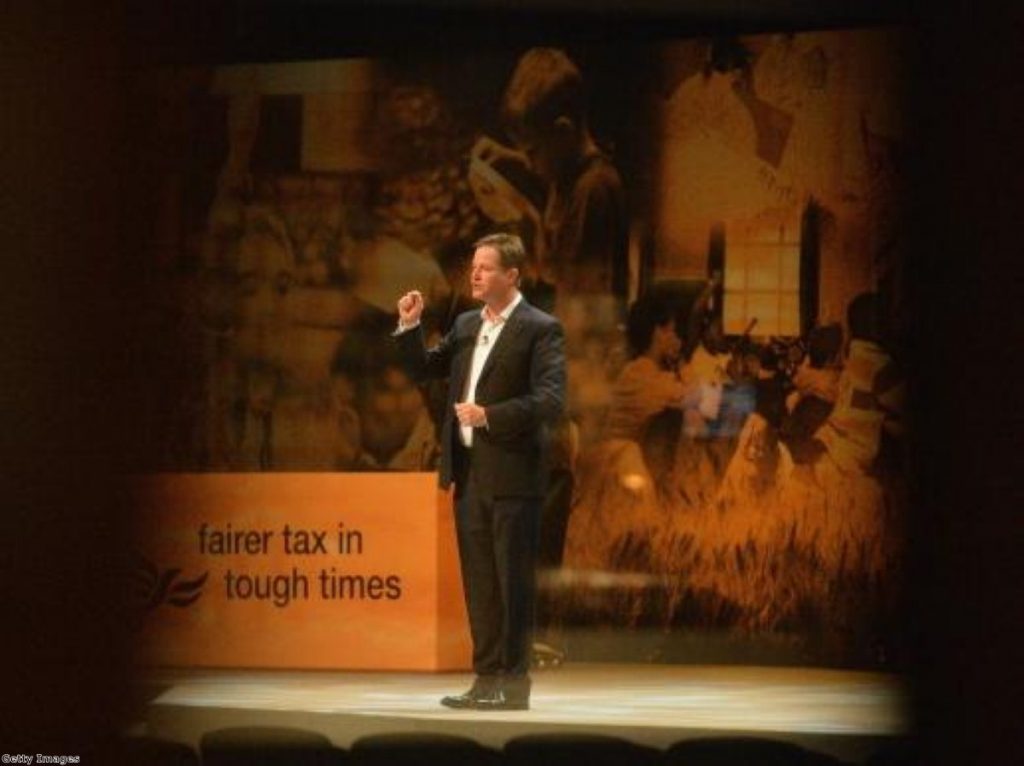Embattled Lib Dems move against richest
Nick Clegg is pushing for more taxation targeting Britain's millionaires as he seeks to re-establish his authority over his bruised and battered Liberal Democrat party.
The Lib Dems are meeting under grey clouds in Brighton this week for their autumn conference – an apt picture given its torrid performance in recent polling.
An Observer/Opinium poll even put the Liberal Democrats in fourth place with eight per cent, behind Ukip on ten per cent. Clegg himself faces appalling numbers, fuelling speculation about his own future in charge of the party going into the 2015 general elections. A poll by the grassroots Lib Dem Voice website has put him on a net rating of minus two, the first time he has fallen into negative territory.
"Of course the polls are bad, but… if people who don't agree [with Liberal Democrat policies] are keen to engage in quite a civil way," Clegg told BBC1's The Andrew Marr Show.


"The idea that there's this constant remorseless abuse isn't the way I experience it."
He has responded to the growing pressure by apologising for breaking the party's pledge not to raise tuition fees under any circumstances – prompting a mixture of mockery and admiration online – and using the Brighton conference to push for fairer taxes in negotiations with the Conservatives.
Clegg also announced the Treasury is working on a 'pension for property' scheme in which parents can help their children get on the property ladder by using their pension pots as a guarantee.
With the double-dip recession having ended any hopes of the current austerity drive being over by 2015, further "belt-tightening" is now inevitable. Clegg hopes to secure support by forcing Tory ministers to impose some taxes on the wealthiest, rather than simply targeting the welfare budget in order to make savings.
"This is a huge undertaking for us as a country. I start from the simple principle that we should start from the top and work down… when you try to make the numbers work," he said this morning.
"I will not accept a new wave of fiscal retrenchment without asking people at the top to make an additional contribution.
"I don't think you can ask people on middle and low incomes… to bear the brunt of this adjustment."
The coalition will have to make spending plans for the 2015/16 financial year, going beyond the 2015 general election. After that the Lib Dems will not be bound to Tory proposals for the remainder of the next parliament.
Initial moves against around 500,000 people with assets or personal wealth worth over £1 million would focus on extra scrutiny to avoid the Treasury losing money through tax-dodging, the Mail on Sunday newspaper reported.
HM Revenue and Customs' affluence unit is being reinforced and its remit is being expanded from those with net wealth of over £2.5 million to any millionaire.
The Lib Dems are also set to press ahead with their calls for the introduction of a mansion tax on properties worth over £2 million. Conservative ministers oppose the measures, setting up the prospect of a major clash within the Cabinet.
"We are proving that coalition works. But we need discipline," the deputy prime minister told party delegates at a rally on Saturday night.
"Yes, we must show people that we are different from our coalition partners. But if all people see is squabbling then they will think coalition is a messy, incoherent thing."
Energy and climate change secretary Ed Davey led attacks against the Conservatives at the start of the Brighton conference, telling the Observer newspaper "tea-party Tories" were threatening his environmental agenda. His comments are thought to be particularly directed against the Treasury.
"Conservative critics are getting in the way of growth for our economy, and green growth," he told Sky News' Murnaghan programme.
"George Osborne the chancellor needs to make sure our economy is growing. He knows when you look at all the building work the government is trying to push, energy is about half of that planned infrastructure investment.
"I'm absolutely sure the chancellor wants growth and I think he recognises energy infrastructure investment is really critical to doing that."
Tensions with the Tories are an essential part of the Lib Dems 'differentiation' bid to distinguish themselves from David Cameron and his colleagues.
"Yes, there are anxieties, yes there are concerns about the damage done to our standing in the polls because of what we've done in coalition government," Clegg added this morning.
"But there is extraordinary resilience and unity."
He made clear that, despite the bleak outlook in the polls, he was not prepared to consider resigning before 2015. "The idea that when you're halfway up a mountain you suddenly bail out," he began, before insisting: "I'm not going to flinch."
YouGov's research for the Sunday Times newspaper put the Liberal Democrat vote share at just nine per cent, with Labour on 41% and the Conservatives on 34%.
Clegg's rating among the general public is now minus 63% – one point worse than former Labour prime minister Gordon Brown's low point of 62% in June 2008.

